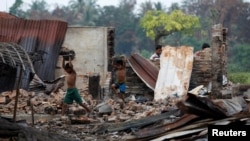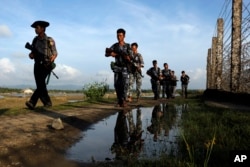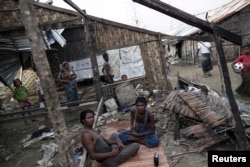Ignoring international appeals, Bangladesh is holding to its decision to bar Rohingya Muslim refugees fleeing Myanmar by boat after new sectarian violence broke out in the Buddhist-majority country.
As a military lockdown in northwestern Myanmar's Rakhine state stretches into a second month, hundreds of Rohingya people have sought to illegally cross over to neighboring Bangladesh. The United Nations last week said 30,000 people, mostly Muslim Rohingya, have been displaced and rights groups estaimate more than 80 have been killed during the crackdown.
The United Nations High Commissioner for Refugees (UNHCR) urged Myanmar to take all measures to protect civilians in Rakhine.
“We are also appealing to the government of Bangladesh to keep its border with Myanmar open and allow safe passage to any civilians from Myanmar fleeing violence,” UNHCR spokesman Adrian Edwards said in Geneva last week.
However, Bangladesh border guards said they have been ordered bar any Rohingya from entering Bangladesh.
“In the past six weeks we have pushed back dozens of Rohingya-laden boats before they could reach Bangladeshi territory. We have been intercepting two or three such boats every day. They all are being sent back toward Myanmar,” Lt Col Abuzar Al Zahid, commanding officer of Border Guard Bangladesh (BGB) in southeastern Bangladesh, told VOA.
Still, local people in the Bangladesh border town of Teknaf told VOA that a few hundred Rohingya have managed to sneak across the border.
The latest round of tension broke out in Rakhine, where most Rohingya live in Myanmar, after armed men attacked border guard posts and killed nine policemen on October 9.
Army accused of abuses
Blaming the attack on Rohingya militants, the Myanmar army locked down Rohingya villages. Since then, the army has been accused of human rights abuses against the Rohingya, including extrajudicial killings, rapes and arson.
During the crackdown the army used helicopter gunships, reportedly leaving dozens of Rohingya killed.
Different independent groups have put the death toll at 150 to 300, but there are no means to verify these claims. The U.S.-based Human Rights Watch group said Monday that by using satellite imagery it had identified 1,250 houses or buildings that had been destroyed in Rakhine.
Teknaf tourist guide Foizullah, who like many Rohingya uses only one name, said that from his town he saw flames and smoke in Rohingya areas in Maungdaw, on the other side of the Naf River.
“We spoke to some Rohingya people who came from that side and they said that the houses of the community were being torched by the security forces almost every day,” Foizullah told VOA. “I know, at least 400 Rohingya men, women and children entered Bangladesh Sunday. This is also a fact that Bangladeshi border guards are pushing back Rohingya boats every day.”
Bangladesh’s home minister Asaduzzaman Khan Kamal said that the ongoing violence in Myanmar is a cause of “discomfort” for his country.
“However, we have kept our BGB, Coast Guard and police prepared to thwart any infiltration attempt by the Rohingya people from Myanmar,” Kamal said Sunday.
Rights groups have criticized Bangladesh’s ban on the Rohingya boatpeople.
'Sluggish' international response
C. R. Abrar, president of the human rights group Odhikar in Dhaka, said if Bangladesh follows its constitution, it cannot deny refuge to the Rohingya.
“Bangladesh should open its border for the fleeing Rohingya people on humanitarian ground,” Abrar said. He heads the Refugee and Migratory Movements Research Unit (RMMRU) at the University of Dhaka.
“The international communities have been sluggish in initiating action to act on the issue involved of the Rohingya. In the absence of such global pressure on Myanmar the situation for the Rohingya in the country is worsening,” he said.
Phil Robertson, Asia deputy director of Human Rights Watch, said the displaced Rohingya are facing serious deprivation with international food aid and other assistance being blocked by authorities in Myanmar.
“The Bangladesh government should recognize this critical humanitarian urgency of this situation and permit Rohingya fleeing to cross the border to safety. These poor people literally have nowhere to go, they are between the devil and the deep blue sea – and Bangladesh is their only way out,” Robertson told VOA. “The Bangladesh government also needs to demand that Burma cease its policies of discrimination and persecution of the Rohingya, so this crisis of people fleeing Rakhine state can finally stop.”
Burma Campaign UK director Mark Farmaner said that Bangladesh is “effectively sentencing Rohingya to death” by refusing them entry.
“They are fleeing violations of international law and Bangladesh has a responsibility to help. The international community should be pressuring Bangladesh to open its borders and accept international aid being offered to help Rohingya refugees,” Farmaner told VOA.







